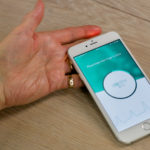 Last year I wrote about an interesting mobile app, called Heart for Heart, which allows us to monitor the health of our heart. Users place their fingers on the camera lens of their smartphone, and hold it there for 90 seconds to allow the app to take a pulse reading.
Last year I wrote about an interesting mobile app, called Heart for Heart, which allows us to monitor the health of our heart. Users place their fingers on the camera lens of their smartphone, and hold it there for 90 seconds to allow the app to take a pulse reading.
A similar approach is being adopted by Belgian startup FibriCheck, who are part of the EIT Health stable of startups.
It’s estimated that around 25% of us will develop atrial fibrillation at some point in our lives, which amounts to something like 17 million people across the European Union by 2030. This matters, as these people have an almost twofold increase in mortality. The good news is that it can be treated with anticoagulants, but it requires regular screening to detect it in time.
This can be costly, as systematic ECG screening of over 65’s can be expensive, even before you get into the 72-hour monitoring that is recommended for patients with transient ischemic attacks or strokes.
“Currently, the ECG and the 24-hour Holter monitor are the gold standard for diagnosing atrial fibrillation,” the team say. “However, they are cumbersome and are only available in the doctor’s office or hospital. So, more innovative technologies are being developed to diagnose and detect atrial fibrillation.”
Efficient screening
The company recently released a DIGITAL-AF study showcasing the potential of the technology. The team analyzed data from over 12,000 adults using FibriCheck to detect heart rhythm disorders by holding their finger over the camera lens of their smartphone. The app uses pulse plethysmogram (PPG) to measure the variations in the capillary volume from ventricular contractions in the arterial BP wave. These changes are capable of being detected by the camera.
Participants in the study were given simple instructions on how to use the app and complete their 60-second PPG recording, with each volunteer doing two measurements per day over the course of a week. After each measurement, they were given feedback on their heart rhythm and heart rate, whilst the data was also sent to a central server for offline analysis that powered a report given to each volunteer at the end of the week. If any atrial fibrillation was detected, users were recommended to visit their doctor as soon as possible.
During the study period, some 12,127 PPG signals were detected as possible irregularities, out of a total of 120,446. Among this sample, the researchers identified 615 traces of AF in 136 different people.
Early detection
The promise of the app was exemplified by the finding that 76% of those who were identified with AF by the app did not report symptoms themselves.
“Using digital technology only, without any need for additional hardware, we can reach large populations very quickly — in less than 48 hours — and collect clinically meaningful data, without the need for any clinical infrastructure,” the team say. “We didn’t need any ECGs, no doctors or nursing time, and this increased comfort for the patient. They can do measurements anytime, anywhere, and at a fraction of the cost.”
It’s an interesting technology, and the victory FibriCheck achieved at the recent INNOVEIT Venture Awards further exemplifies the progress being made in getting the technology to market. You can learn more about it via the video below.